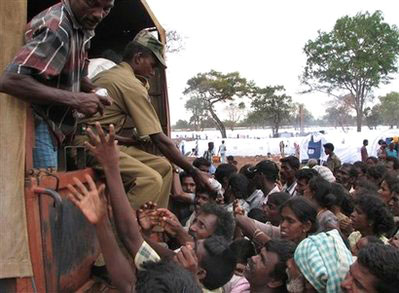A staggering one million dollars is required daily to provide food and water to almost 300,000 conflict survivors who are housed in a string of camp settlements in northern Sri Lanka, says World Vision.
“Funding is becoming a huge concern for aid agencies. Most have already used up a large chunk of their existing relief budgets responding to the crisis,” said Suresh Bartlett, national director of World Vision Sri Lanka.
The 26-year-long conflict between the Sri Lanka government and the separatist Liberation Tamil Tiger Eelam (LTTE) ended on May 17, with the capture of the last strip of coastland occupied by the rebels in northeast Sri Lanka and the deaths of the separatist leader Velupillai Prabhakaran and other senior leaders.
The United Nations estimates that up to 100,000 people died during the civil war, including at least 7,000 civilians killed in the past five months. Over a quarter million people have been left homeless and are struggling to cope in make-shift camps.
The cost of providing essential food and water is around $3.50 per person per day. But this does not take into account the provision of shelter, medical care, or children’s schooling for those in the camps.
Aid agencies are stretched thin in their efforts to support some 288,000 displaced people – 90,000 of whom are children – who fled the conflict zone and are now accommodated in camps in the districts of Vavuniya, and Jaffna in the North and in Trincomalee in the East.
There is an urgent need for substantial funding from the international community in order to help the displaced rebuild the shattered lives of children and their families. However, the flow of funds has been disappointing.
As of last week the U.N.-driven 2009 Common Humanitarian Action Plan (CHAP) for Sri Lanka was only 32 percent funded with $49.7 million received out of a total of $155 million requested.
“The International Donor Community should not let the politics of giving, or not giving to Sri Lanka, affect the flow of funding that is urgently needed to assist tens of thousands of children and their families. It is imperative that we start to rebuild the lives of those who have been ravaged by conflict and to meet the specific needs of children in particular,” said Bartlett.
“Millions of dollars are needed to fund the return, recovery and rehabilitation phases. None of these programs will be possible without the commitment of the international community to support recovery efforts,” he added.
U.N. Chief Ban Ki Moon visited Manik Farm, the biggest refugee camp holding about 200,000 Tamil civilians when he toured the war zone last Saturday. He described the conditions as “appalling.”
Ban went on to meet President Mahinda Rajapaksa. U.N. officials were hoping to underline with him the importance of winning the peace as well as the war, by reaching out to Tamils and giving them rights in a comprehensive political settlement.
"If issues of reconciliation and social inclusion are not dealt with, history could repeat itself," Ban warned.
To help ensure that Sri Lanka never returns to the cycle of violence, Bartlett called this "a great opportunity for the international community to get involved, to help in the healing and reconciliation process."
World Vision is working with other aid agencies to support and care for the displaced persons in the camps. The organization is providing shelter, food, water and family packs of essential items and is also engaged in supplying complementary food and in supplementary nutritional feeding programs for children under five and nursing mothers.
World Vision continues to advocate for adherence to international standards in camp management and the speedy return of the displaced to their homes.















